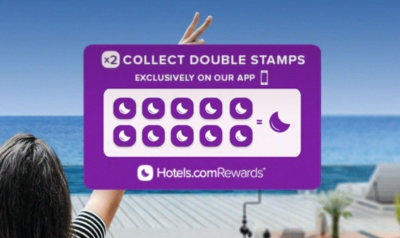What do you think of proposed changes to Hotels.com Rewards?
Links on Head for Points may support the site by paying a commission. See here for all partner links.
Hotels.com is considering changes to the ‘free night for every 10 nights you stay’ benefit with Hotels.com Rewards.
The company recently asked selected members to answer a questionnaire on different reward options. In general, the proposed options are worse than the current Hotels.com Rewards scheme.
(Yes, I know. Big surprise.)
Why do we like Hotels.com Rewards?
We rate Hotels.com Rewards highly.
It is a pleasingly simple scheme. For every 10 nights you stay, you receive a free night. The value of the free night is the average of the ex-tax price of those ten nights.

There is no time limit to how long it takes to earn your free night, as long as you do at least one stay in every 12 month period.
If you are about to hit your 12 month anniversary without a stay, a booking at a £3 hostel somewhere in the developing world will usually credit and reset the timer.
The only ‘snag’ is that you don’t get any change when you spend your free night, so you need to use it on a fairly expensive stay. You will also not collect new Hotels.com Rewards credits on your reward stay.
Some Head for Points readers find Hotels.com Rewards BETTER than a standard hotel loyalty scheme. Hotels.com has more hotels than every major hotel brand PUT TOGETHER. You never have to compromise on location or hotel quality, as you often do if you are tied to Hilton, IHG etc. You also get rewarded for ALL of your stays, even at independent unbranded properties.
The downside is that you don’t earn any hotel loyalty points or status benefits – no upgrades, no late check-out, no free breakfast – on your stays.
You can find out more about Hotels.com Rewards on its website here.
What is Hotels.com Rewards planning?
The survey coverered a number of potential scenarios. Respondents were shown two different options side by side, chosen at random, and asked which they preferred. For example:
Sample scenario:
You no longer need to do 10 nights before you redeem. Instead, each stay earns you a credit of 10% of the ex-tax value which you can redeem against your next stay.
Ability to use credits towards breakfast, upgrades, spa etc.
Sample scenario:
Each stay earns you a credit of 7% of the ex-tax value
You can redeem at any point BUT you must have enough credit to cover the full cost of the stay
Credits can also be turned into Uber / Lyft credit or airport lounge passes
Ability to use credits towards breakfast, upgrades, spa etc
Sample scenario:
Each stay earns you a credit of 7% of the ex-tax value
Silver members (7 nights in a year) receive 7.35% whilst Gold members (25 nights in a year) receive 7.7%
You can redeem at any point BUT you must have enough credit to cover at least 75% of the cost of the stay
Credits can also be used on Hotels.com partner sites such as Expedia and VRBO
Ability to use credits towards breakfast, upgrades, spa etc

Sample scenario:
Each stay earns you a credit of 8% of the ex-tax value, with a selection of ‘top’ properties earning 16% credit
You can redeem at any point BUT you must have enough credit to cover 75% of the cost of the stay
Ability to use credits towards breakfast, upgrades, spa etc
Sample scenario:
Each stay earns you a credit of 7% of the ex-tax value, with a selection of ‘top’ properties earning 14% credit
You can redeem at any point BUT you must have enough credit to cover at least 75% of the cost of the stay
Credits can also be turned into Uber / Lyft credit or airport lounge passes
Ability to use credits towards breakfast, upgrades, spa etc
Sample scenario:
Each night earns you 1 free night stamp
Get a free night when you have collected 12 stamps, with the night worth the average cost of the 12 nights
Alternatively, redeem 6 stamps for a free night credit worth 40% of the average cost of your six nights
I should add that the scenarios also involved tweaking the number of nights required for status in Hotels.com Rewards. However, in general I do not find that people take Hotels.com Rewards elite status, or its benefits, seriously.
Are any of these scenarios positive for members?
Put it this way, none are a major improvement.
The first one – 10% credit after every stay, redeemable immediately, IS better than the current ‘free night after 10 stays’ because you can redeem your 10% straight away. This removes the gamification element from the programme, however, so I don’t see why Hotels.com Rewards would do this.
The other scenarios effectively cut the reward benefit from 10% to something closer to 7%-8%. The company tries to dress this up but, in effect, you are getting less back.
Of course, the devil is in the detail – if it dropped to 8% but a high proportion of hotels were classed as ‘top’ properties earning double credits, you would be better off.
You may also, personally, prefer a 7% cashback credit to use on your next stay versus a 10% return which only turns up after doing 10 nights. There is a trend in loyalty today to offer returns faster driven by the assumption that millennials have the attention span of a gnat.
Hotels.com needs to be careful ….
There is something key that Hotels.com needs to remember
Whilst technically sister companies, Hotels.com and Expedia are, fundamentally, the same business. In general, they sell the same hotels at the same prices. The ONLY difference, apart from Expedia also offering flights, is that Hotels.com has a very generous reward programme.
Expedia, on the other hand, has Expedia Rewards which we reviewed here. It isn’t great.
Expedia also owns eBookers. We reviewed ebookers BONUS+ here. Again, it isn’t great but it is better than Expedia Rewards as it offers airport lounge passes for regular bookers.
The bottom line is that the whole point of Hotels.com is that it offers a good loyalty scheme. Without one, it might as well cease to exist as it would literally be a clone of Expedia and ebookers. Any attempt to water down Hotels.com Rewards could be a mistake.
PS. If you are not a regular Head for Points visitor, why not sign up for our FREE weekly or daily newsletters? They are full of the latest Avios, airline, hotel and credit card points news and will help you travel better. To join our 70,000 free subscribers, click the button below or visit this page of the site to find out more. Thank you.

Hotel offers update – July 2025:
Want to earn more hotel points? Click here to see our complete list of promotions from the major hotel chains or use the ‘Hotel Offers’ link in the menu bar at the top of the page.
SPECIAL OFFER: Until 15th July 2025, the sign-up bonus on the Marriott Bonvoy American Express Card is TRIPLED to 60,000 Marriott Bonvoy points. This would convert into 25,000 Avios or into 40 other airline schemes. It would also get you at least £300 of Marriott hotel stays based on our 0.5p per point low-end valuation. Other T&C apply and remain unchanged. Click here for our full card review and click here to apply.
SPECIAL OFFER: Until 14th August 2025, the sign-up bonus on the Hilton Honors Plus debit card is TRIPLED to 30,000 Hilton Honors points. You will also receive Gold Elite status in Hilton Honors for as long as you hold the card. Click here for our full card review and click here to apply.
Want to buy hotel points?
- Hilton Honors is offering a 100% bonus when you buy points by 24th July 2025. Click here to buy.
- IHG One Rewards is offering a 100% bonus when you buy points by 17th July 2025. Click here to buy.
- Marriott Bonvoy is offering a 30% to 50% bonus (varies by individual) when you buy points by 16th July 2025. Click here to buy.
- World of Hyatt is offering a 20% bonus when you buy points by 21st July 2025. Click here to buy.



 Rob
Rob 





Comments (107)